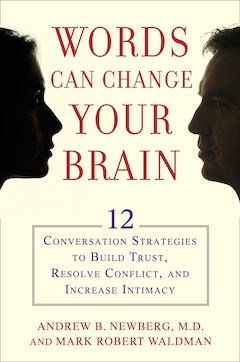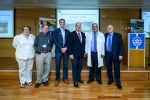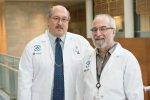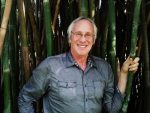Mark Waldman has been working with neuroscientist Dr. Andrew Newberg for almost two decades, including on their latest book, Words Can Change Your Brain. (photo from Mark Waldman)
According to Dr. Andrew Newberg, neuroscientist at Thomas Jefferson University, and Mark Robert Waldman, communications expert, in their book Words Can Change Your Brain: 12 Conversation Strategies to Build Trust, Resolve Conflict and Increase Intimacy, one “single word has the power to influence the expression of genes that regulate physical and emotional stress.”
Waldman and Newberg have been collaborating for almost two decades, and have written 14 books about relationships and neuroscience. They have also published many neuroscientific papers and journal articles exploring how different forms of spiritual practice and positive thinking affect the brain.
“This particular book was my idea, because I’d been working on a form of dialogue practice going back to about 1993,” said Waldman of Words Can Change Your Brain.
“A very well-known ancient Jewish meditation is to gaze at a candle until you feel that you and the candle become one … so you and the candle become the sense of united fire or energy,” he said. “You can do the same thing by focusing in on your breathing. You immerse yourself in the cool air coming into your nose, the warm air exhaling, feeling the rising and falling of your chest. When your mind wanders, you simply come back to your breathing as a training mechanism for learning how to stay in the present moment.”
All of these mindfulness practices, said Waldman, have been well documented as having many benefits – from helping lower anxiety, physical stress and emotional stress, to equipping people with better control of their emotions and raising their self-awareness and social awareness.
Waldman suggested starting by bringing mindfulness into daily activities, like eating.
“If you were to slow down and pick up a small piece of food, and hold it on your tongue and savor that one piece of food, you would discover all kinds of different flavors and sensations that we’re not normally conscious of,” he explained. “If you apply mindfulness to eating, you end up eating less and enjoying your food more. This has become an activity that’s been integrated into weight-loss programs and programs to help people interrupt eating disorders like bulimia.”
In 1993, Waldman and Newberg began asking themselves questions like how often are we aware of the words we speak, of the feelings behind those words, of how those words affect the person we are speaking to; how often do we take the time to really savor and pay attention to what the other person is saying, their facial expression, their tone of voice?
They started to develop what they dubbed “dialogical meditation,” which eventually morphed into “compassionate communication.”
 After more than 20 years of research into what speaking mindfully means, they began working on Words Can Change Your Brain, which includes all their new research findings.
After more than 20 years of research into what speaking mindfully means, they began working on Words Can Change Your Brain, which includes all their new research findings.
“Some of what we discovered, based on many different types of neuroscientific studies, is that the slower you speak, the more the listener’s comprehension’s increases,” said Waldman. “Their body also relaxes when you speak more slowly. And, with less physical tension, there’s more ability to be socially connected and engaged with the other individual.
“As our research unfolded, we recognized a very important neurological fact – that, consciously, we can only be aware of about seven to 10 words at a time. So, we created what we called a ‘communication game.’ We have people sit down and face each other and we ask them to speak very slowly and briefly, just one sentence. While they are doing so, we want them to experience what those words actually feel like. Then, they pause after speaking one sentence briefly. They pay close attention to the other person’s face and tone of voice while they speak … and you go back and forth like this.
“What we discovered from the very first time we did this experiment in 1993 is that 25% of those in the room, after doing this slow speaking and listening exercise, had tears rolling down their faces.”
Participants in this process were paired with people they did not know and they were not told what to say in their one sentence. The researchers found that, even when they conducted this experiment in a room with 1,500 people, within four to seven minutes, many people found themselves experiencing profound, intimate dialogue.
“They had to let the other person listen deeply to that one sentence and respond,” said Waldman. “So, we were keeping people in the present moment, grounded, not just in the thoughts they had that we are normally trying to turn into words, but to pay attention to the other person’s facial expression and tone of voice.”
Waldman went on to explain that, when it comes to communication, of the seven different elements of effective communication, words are Number 7. Number 1 is facial expression, followed by tone of voice, body language and the emotional or mental state you are in.
“So, the more relaxed you are, the more you’re actually in the present moment, the more the other person can understand what you’re saying, be affected by what you’re saying,” said Waldman.
The research found that, when participants closed their eyes and recalled a pleasant memory, visualized someone they greatly love or an event that brought them great satisfaction, 90% of them had a half-smile on their faces.
Waldman described this as a “Mona Lisa smile that, when other people see it, it triggers the trust centres in the person’s brain. You neurologically trust someone who has this Mona Lisa-like smile.”
Waldman believes that this research lends itself well to teaching managers, salespeople, teachers and those just entering the dating world. “What would happen if you slowed your speaking down and listened more closely, if you maintained that small half-smile on your face?” he asked. “As you speak, you can generate better intimacy and stimulate more collaboration and cooperation.”
Words Can Change Your Brain also documents that one single negative word triggers a dozen different stress neuro-chemicals in the brain, while spoken positive words have very little effect on the brain.
“So, the brain is designed to encode into memory every negative thought, feeling and event that we have, yet it doesn’t really do that with positive experiences,” explained Waldman. “However, if you have a brain that is filled mostly with negative memories, you’ll become chronically anxious and, eventually, chronically depressed.
“When we bring in the research of Barbara Frederickson and learn that, in relationships and in business, if you deliberately increase what she calls, ‘your positivity ratio,’ to five-to-one or to seven-to-one, for every negative thought or feeling you have … if you deliberately generate another five, six or seven positive thoughts or images … that’s how you begin to build a brain filled also with positive memories. You’re creating a form of neurological optimism. And, it turns out, these types of positive mindfulness exercises are some of the best ways to eliminate anxiety [and] depression and build more self-love and self-compassion. If your positivity ratio falls below three-to-one, you can predict very accurately that a relationship is heading toward divorce or that a company is heading toward bankruptcy.”
As Waldman presented their discoveries to the business world, he was reminded that, in this world, almost no one will give you more than 10 to 60 seconds. Most people cannot do a five-minute meditation, he said.
But, Waldman found that, if people download the mindfulness talk on their phone or computer and are willing to take 10 seconds to do one mindful yawn when they hear the alarm ring – simply notice how a yawn feels – there can be benefits.
“We have over 43 documented studies that show that yawning is one of the fastest ways to slow down an overly stressed brain,” said Waldman. “In fact, a dozen yawns or so can temporarily alleviate symptoms of Parkinson’s, epilepsy, migraines, what have you. So, yawning is the fastest way to alleviate mental stress.
“We ask a person, once an hour, to take 10 seconds to do one mindful yawn…. Take 20 seconds to do one mindful stretch, recall one pleasant memory…. Think about one single word, a value word, that you want to anchor yourself in for the next hour, something like ‘confidence,’ ‘focus’ or ‘calmness.’”
Thinking of Judaism’s role in all of this, Waldman said, “I think, for me, Judaism gave me the framework to question, challenge and think deeply about everything, which is just one of the most thrilling spiritual states I find for myself. I think this is how Judaism has influenced me in the past and continues to guide me in the present.”
Rebeca Kuropatwa is a Winnipeg freelance writer.







 After more than 20 years of research into what speaking mindfully means, they began working on Words Can Change Your Brain, which includes all their new research findings.
After more than 20 years of research into what speaking mindfully means, they began working on Words Can Change Your Brain, which includes all their new research findings.


 In a mere 30 pages, with text and illustrations by Shefrin, Embroidered Cancer Comic shows Bossin’s uncertainty over treatment options, his efforts to learn more about the cancer, the emotional stress on him and Shefrin, as well as the effects of the cancer and its treatments on the couple’s sex life.
In a mere 30 pages, with text and illustrations by Shefrin, Embroidered Cancer Comic shows Bossin’s uncertainty over treatment options, his efforts to learn more about the cancer, the emotional stress on him and Shefrin, as well as the effects of the cancer and its treatments on the couple’s sex life.